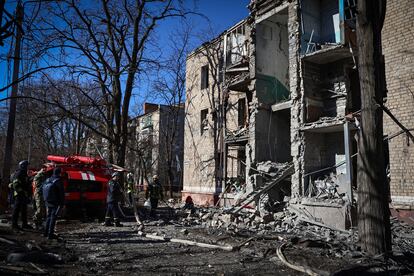Russian missile hits Ukrainian apartment building, killing at least one person
Ukrainian President Volodymyr Zelensky posted a video showing gaping holes in the façade of the low-rise building that bore the brunt of the strike

A Russian missile struck an apartment building in the center of Kramatorsk on Tuesday, killing at least one person and wounding seven others in one of Ukraine’s major city strongholds in its eastern Donetsk region as it fights against Moscow’s invasion, officials said.
Ukrainian President Volodymyr Zelensky posted a video showing gaping holes in the façade of the low-rise building that bore the brunt of the strike.
The Ukrainian general prosecutor’s office and regional Governor Pavlo Kyrylenko also reported on the attack, posting photos of the building with mounds of rubble in front of it. The impact damaged nine apartment blocks, a kindergarten, a local bank branch and two cars, Kyrylenko said.
The war, which erupted after Russia’s launched its full-scale invasion in February 2022, has brought heavy civilian casualties. Tuesday’s victims were among at least seven civilians killed and 30 wounded in 24 hours, Ukraine authorities said.
They included a 55-year-old woman killed when a Russian shell hit her car Tuesday in a border town in northeastern Ukraine.
“Russian troops are striking residential buildings, schools and hospitals, leaving cities on fire and in ruins,” Kyrylenko, the regional governor, said on Ukrainian television. “The Russians mark each meter (yard) of their advance in the region not only with their own blood, but also with the (lost) lives of civilians.”
Kramatorsk houses the local Ukrainian army headquarters. Ukrainian authorities say it has been regularly targeted by Russian shelling and other attacks in the past.
A missile strike on the city’s train station last April, which Kyiv and much of the international community blamed on Moscow, killed dozens of people and wounded more than 100.
Russian President Vladimir Putin, speaking Tuesday during a meeting with workers at a helicopter factory in southern Siberia, once again justified the conflict in Ukraine as an existential one for Russia, saying that it’s fighting for its existence as a state.
“For us, it’s not a geopolitical task,” Putin said, “it’s the task of survival of Russian statehood and the creation of conditions for the future development of our country.”
Putin emphasized that his country’s industries have survived the blow of Western sanctions. But he acknowledged those sanctions could bring longer-term problems for the Russian economy.
Russia had welcomed a Chinese peace proposal to end the fighting, but Kremlin spokesman Dmitry Peskov said Tuesday that Kyiv’s refusal to have talks leaves Moscow with only military options.
Beijing has said it has a “no limits friendship” with Russia and has refused to criticize Moscow’s invasion, or even refer to it as an invasion.
“We must achieve our goals,” Peskov told reporters. “Given the current stance of the Kyiv regime, now it’s only possible by military means.”
However, Moscow’s pursuit of its goals in Ukraine has been slowed by poor war management and short resources after being beaten back at the end of last year in a Ukrainian counteroffensive, military analysts say.
The UK Ministry of Defense said Tuesday that Russia’s artillery ammunition shortages “have likely worsened to the extent that extremely punitive shell-rationing is in force on many parts of the front.”
That shortcoming, it said, has “almost certainly been a key reason why no Russian formation has recently been able to generate operationally significant offensive action.”
Sign up for our weekly newsletter to get more English-language news coverage from EL PAÍS USA Edition
Tu suscripción se está usando en otro dispositivo
¿Quieres añadir otro usuario a tu suscripción?
Si continúas leyendo en este dispositivo, no se podrá leer en el otro.
FlechaTu suscripción se está usando en otro dispositivo y solo puedes acceder a EL PAÍS desde un dispositivo a la vez.
Si quieres compartir tu cuenta, cambia tu suscripción a la modalidad Premium, así podrás añadir otro usuario. Cada uno accederá con su propia cuenta de email, lo que os permitirá personalizar vuestra experiencia en EL PAÍS.
¿Tienes una suscripción de empresa? Accede aquí para contratar más cuentas.
En el caso de no saber quién está usando tu cuenta, te recomendamos cambiar tu contraseña aquí.
Si decides continuar compartiendo tu cuenta, este mensaje se mostrará en tu dispositivo y en el de la otra persona que está usando tu cuenta de forma indefinida, afectando a tu experiencia de lectura. Puedes consultar aquí los términos y condiciones de la suscripción digital.








































